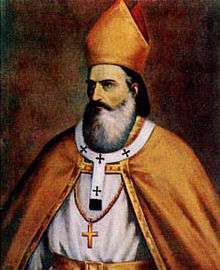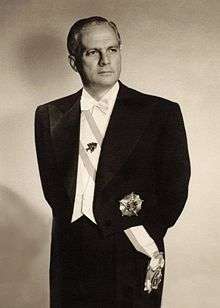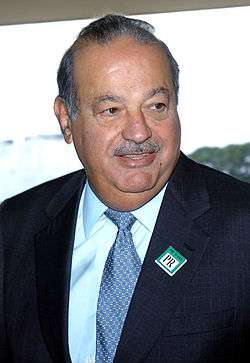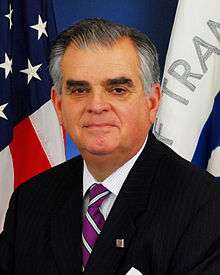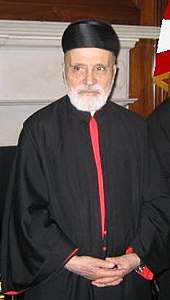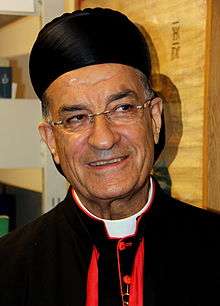Lebanese diaspora
Lebanese diaspora refers to Lebanese migrants and their descendants who, whether by choice or coercion, emigrated from Lebanon and now reside in other countries. There are more Lebanese living outside Lebanon (4 to 8 million), than within the country (4 million). Most the diaspora population consists of Lebanese Christians; ll, but some of it is Muslim, Druze, or Jewish. The Christians trace their origin to several waves of emigration, starting with the exodus that followed the 1860 Lebanon conflict in Ottoman Syria.
| Total population | |
|---|---|
| From 4[1][2] to possibly 14 million[2][3] | |
| Languages | |
| Brazilian Portuguese, Spanish, French, English, Lebanese Arabic, Armenian | |
| Religion | |
| Christianity (mainly Maronite, as well as Eastern Orthodox, Melkite, Roman Catholic, Protestant, and non-native to Lebanon such as Armenian Orthodox, Armenian Catholic, Syriac Orthodox, Syriac Catholic), Islam (mainly Shia, Sunni, in addition to Alawite), Druze, and Jews |
| Part of a series of articles on |
| Lebanese people |
|---|
 |
|
Lebanese people
|
|
Communities Native communities outside of Lebanon:
Europe Overseas
Middle East |
|
Language |
|
Politics |
|
|
Under the current Lebanese nationality law, diaspora Lebanese do not have an automatic right to return to Lebanon. Varying degrees of assimilation and a high degree of interethnic marriages in the Lebanese diaspora communities, regardless of religious affiliation caused most diaspora Lebanese not to have passed Arabic to their children although they still maintain a Lebanese ethnic identity.
The largest diaspora by far resides in Brazil, with between 2 and 5 million, followed by Argentina and Colombia, with about a million each.
Demographics
Although there are no reliable figures, the diaspora is estimated to be around 8 to 10 million people, far more than the internal population of Lebanon of around 4 million citizens.[3][4] According to other estimates, the number of Lebanese living outside the country is thought to at least double the number of citizens living inside,[1] which means at least 8 million people. Of the diaspora, 1.2 million are Lebanese citizens.[5]
History
The Lebanese diaspora, while historically trade-related, has more recently been linked to the Lebanese Civil War, with many Lebanese emigrating to Western countries. Because of the economic opportunities, many Lebanese have also worked in the Arab World, most notably Arab states of the Persian Gulf like Saudi Arabia and Kuwait. Currently around 50% of Lebanese citizens resident in Lebanon are Muslim and around 50% are Christian.[6]
The Americas have long been a destination for Lebanese migration, with Lebanese arriving in some countries at least as early as the nineteenth century. The largest concentration of Lebanese outside the Middle East is in Brazil, which has, according to some sources, at least 6 million Brazilians of Lebanese ancestry, making Brazil's population of Lebanese more than twice that of the entire population of Lebanon. The population of Brazil of either full or partial Lebanese descent is estimated at 7 [7] million people by Arab-Brazilian organizations. According to a research conducted by IBGE in 2008, covering only the states of Amazonas, Paraíba, São Paulo, Rio Grande do Sul, Mato Grosso and Distrito Federal, 0.9% of white Brazilian respondents said they had family origins in the Middle East [8]
There are also other large Lebanese communities in Latin American countries, namely Argentina, Mexico, Colombia, Ecuador, Paraguay, Venezuela, Haiti and Dominican Republic. Many Lebanese have also been settled for quite some time in the United States, Canada, Australia, The United Kingdom, South Africa and in the European Union member states. There are also sizable populations in The United Arab Emirates, Singapore as well as francophone West Africa, particularly Ivory Coast and Ghana.
A law passed in 2008 permitted Lebanese abroad to vote in Lebanese elections starting in 2013.[9]
Business networks and economic impacts
Many Lebanese entrepreneurs and business people worldwide have proved very successful, in all kinds of sectors and contexts. Therefore, Lebanese abroad are considered "rich, educated and influential."[10] Remittances from Lebanese abroad to family members within the country were estimated at $8.9 billion in 2014 and accounted for 18% of the country's economy.[11] However, there remains a great untapped potential for further collaboration and cooperation between the diaspora and the Lebanese in their home-country. Foreign direct investment is below 7% of the GDP, and almost half the Lebanese population is in tertiary education.
Throughout its history, the Lebanese diaspora used the Lebanese identity to create strong networks to help its members out. That helped develop a productive and profitable activity. Over the course of time, immigration has indeed yielded Lebanese "commercial networks" throughout the world.[12]
Lebanese populations in the diaspora
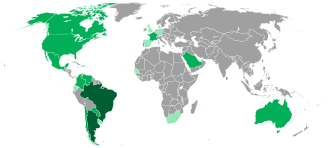
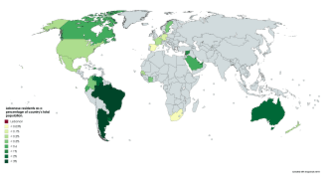
The list below contains approximate figures for people of full or partial Lebanese descent by country of residence, largely taken from the iLoubnan diaspora map.[13] Additional reliable cites have been provided where possible. Additional estimates have been included where they can be cited; where applicable, these are used in place of the iLoubnan figures. The Figure below uses the data from the list and calculates the amount of Lebanese residents as a percentage of the total population of the respective country.
| Country | Estimate | Upper Estimate | Region | Country article in English Wikipedia | List of personalities of Lebanese origin |
|---|---|---|---|---|---|
| 2,000,000 according to a research conducted by IBGE in 2008, covering only the states of Amazonas, Paraíba, São Paulo, Rio Grande do Sul, Mato Grosso and Distrito Federal, 0.9% of white Brazilian respondents said they had family origins in the Middle East[8] | 5,800,000[13]-7,000,000[14] (Brazilian/Lebanese governments)[15] | Latin America | Lebanese Brazilian | Brazil | |
| 1,200,000[13][16] | 3,500,000[16] | Latin America | Lebanese Argentine | Argentina | |
| 1,000,000[13] | 3,400,000[17] | Latin America | Lebanese Colombian | Colombia | |
| 500,000[18] | 900,000[19] | North America | Lebanese American | United States | |
| 341,000[13] | 500,000[20] | Latin America | Lebanese Venezuelan | Venezuela | |
| 271,000[21][22] | 350,000[23] | Oceania | Lebanese Australian | Australia | |
| 250,000[24][25][26] | 250,000[13] - 300,000[24][27] | European Union | Lebanese French | France | |
| 240,000[13] | 400,000[28] - 505,000 | North America | Lebanese Mexican | Mexico | |
| 190,275[29] | 250,000[30] - 270,000[13] | North America | Lebanese Canadian | Canada | |
| 120,000[13] | 299,000 | Arab World | Lebanese people in Saudi Arabia | Saudi Arabia | |
| 114,000 | Arab World | Lebanese people in Syria | Syria | ||
| 98,000[13] | 250,000 | Latin America | Lebanese Ecuadorian | Ecuador | |
| 80,000[31] | Latin America | Lebanese Dominican | |||
| 80,000[4] | 156,000 | Arab World | Lebanese people in the United Arab Emirates | United Arab Emirates | |
| 75,000 | 75,000[32] | Africa | |||
| 53,000[13] | 70,000[33] | Latin America | Lebanese Uruguayan | Uruguay | |
| 50,000[34] | 300,000[35][36] | Sub-Saharan Africa | Lebanese people in Ivory Coast | ||
| 8,500[13] | Oceania | Lebanese New Zealander | |||
| 44,000[37] | 150,000[38] | Sub-Saharan Africa | Lebanese people in Sierra Leone | ||
| 41,775[39] | 106,000[40] | Arab World | Lebanese people in Kuwait | ||
| 30,000[41][42] | Sub-Saharan Africa | Lebanese Senegalese | |||
| 26,906[43] | European Union | Lebanese people in Sweden | Sweden | ||
| 26,705[44] | European Union | Lebanese people in Denmark | Denmark | ||
| 25,000[45] | 191,000 | Arab World | Lebanese people in Qatar | ||
| 11,820[13] | European Union | Lebanese Spanish | Spain | ||
| 5,100 | 20,000[46] | Sub-Saharan Africa | Lebanese people in South Africa | South Africa | |
| 2,400 | 5,000 | European Union | Lebanese people in Belgium | Belgium | |
| unknown | 2,700[47] | Middle East | |||
| unknown | European Union | Lebanese German | Germany | ||
| Caribbean[note 1] | 545,200[13] | Latin America | Lebanese Jamaican | Caribbean · Cuba · Haiti · Jamaica | |
| Rest of Latin America, ex. Caribbean[note 2] | 181,800[13] | Latin America | Lebanese Chileans | Chile · Guatemala · Dutch Antilles | |
| Scandinavia | 108,220[13] | European Union | Lebanese Swedish | Sweden · Denmark | |
| Rest of GCC[note 3] | 105,000[13] | Arab World | |||
| Rest of European Union[note 4] | 96,780[13] | European Union | Lebanese British · Lebanese Bulgarian** · Lebanese Greek | Bulgaria · Cyprus · Germany · Italy · Monaco · Netherlands · Switzerland · UK | |
| Rest of Sub-Saharan Africa[note 5] | 42,510[13] | Sub-Saharan Africa | Lebanese Sierra Leonean | Ghana · Sierra Leone | |
| North Africa[note 6] | 14,000[13] | North Africa | Lebanese Egyptian | Egypt | |
| Asia[note 7] | 2,600[13] | Asia |
Note: An important percentage of Arabs in Argentina, Brazil, Colombia, Mexico, Venezuela, Bulgaria, Romania, Italy, Portugal and Spain are of Lebanese ancestry. They are denoted ** for this purpose.
Outreach to the Lebanese diaspora by the Lebanese government
The Lebanese government increasingly sees the diaspora as a critical resource for investment and new immigrants. A 2016 television ad tried to entice Lebanese in the United States to move to Lebanon to help improve the standard of living.[48]
The Lebanese government launched the DiasporaID program in August 2017 to better connect Lebanese abroad to Lebanon itself. Funding for the project was provided by USAID with an objective of improving foreign investment in Lebanon.[49]
On August 8, 2017, Lebanese President Michel Aoun advocated children of Lebanese in the diaspora take on Lebanese citizenship during a speech to the Maronite Diaspora Institution at Baabda Palace.[50]
Notable persons of Lebanese Christian descent

 Top row (left to right) Some of the figures are of Lebanese Descent, while others are Lebanese Citizens John Maron • Charbel Makhluf • Estephan El Douaihy • Elias Peter Hoayek • Youssef Bey Karam[51] • Former Lebanese President Camille Chamoun • Fairuz • Khalil Gibran • Former Lebanese President Bachir Gemayel • Carlos Slim • Sabah • Carlos Ghosn • Elie Saab • Charles Elachi • John Abizaid • John Abizaid • Elissa • Etienne Saqr • Donna Shalala • Ray LaHood • Michel Temer • U.S. Presidency Candidate Ralph Nader • Miss USA 2010 Rima Fakih • Amal Clooney • Nasrallah Boutros Sfeir • Bechara Boutros al-Rahi • Lebanese President Michel Suleiman |
Famous scientists of Lebanese descent include: Peter Medawar (Nobel Prize in Physiology and Medicine), Elias Corey (Nobel Prize in Chemistry), Michael Atiyah (Fields Medalist, Mathematics), Michael DeBakey (medical innovator), Mona Nemer (Canada's Chief Science Advisor) and geneticist Huda Zoghbi . Famous writers include William Peter Blatty, film director Alex Garland, Nassim Nicholas Taleb and screenwriter and film producer Geoff Johns.
Prominent members of the Lebanese diaspora include Presidents and Vice-Presidents, e.g. Michel Temer (Brazil), Julio Teodoro Salem, Abdalá Bucaram, Alberto Dahik, Jamil Mahuad (all in Ecuador), Jacobo Majluta Azar, Luis Abinader (Dominican Republic), Julio Cesar Turbay (Colombia), Alberto Abdala (Uruguay) and Mario Abdo (current president of Paraguay). Other famous politicians include Ralph Nader, 2000, 2004 and 2008 US presidential candidate, Alex Azar current United States Secretary of Health, Spencer Abraham former United States Secretary of Energy, John Sununu former White House Chief of Staff, Darrell Issa US politician, George J. Mitchell US Politician and Peace Envoy, Philip Habib US Politician and Peace Envoy, politician and author Jeanine Pirro, US Representative Donna Shalala, and Edward Seaga Prime Minister of Jamaica.
Notable military and astronauts include US army general John Abizaid, Navy Seal and Medal of Honor recipient Michael Mansoor as well as astronaut and Congressional Space Medal of Honor recipient Christa McAuliffe.
Famous businessmen of Lebanese descent include Carlos Slim Helú, Carlos Ghosn, Nicolas Hayek, John J. Mack, Jacques Nasser, Debra Cafaro, Joseph J Jacobs, Lucie Salhany, Kevin O' Leary, Marcus Lemonis and famous names in entertainment like Danny Thomas, Marlo Thomas, Salma Hayek, Shakira, Jenna Dewan, Terrence Malick, Tom Shadyac, Tony Shalhoub, Tiffany, Jim Backus, Jane Wiedlin, Kristy McNichol, Zoe Saldana, James Stacy, Catherine Keener, Vince Vaughn, Amy Yasbeck, Khrystyne Haje, Skandar Keynes, Barbara Mori, John Leguizamo, Omar Shariff, Paul Anka, Emilio Stefan, Drake's long time producers and Grammy winners Noah "40" Shebib and Oliver El-Khatib, Ricardo Darin,Oscar-winning composer Gabriel Yared, guitarists Dick Dale and Tommy Bolin, Xavier Dolan, Damian Bichir, Armand Van Helden, Tyler Joseph, Jack Barakat, Bazzi, Thomas Rhett, Mika, models Yamila Diaz-Rahi and Daniella Sarahyba; and sportsmen like Doug Flutie, Rony Seikaly, Marcos Bagdhatis, Patrick Maroon, Johnny Manziel, surfers Kelly Slater and Maya Gabeira, winner of the Indy 500 Bobby Rahal, FIFA World Cup record holder Mario Zagallo, chess Grandmaster Jennifer Shahade and Olympic medalists Jordyn Wieber, Florencia Habif, Matt Abood and Thaisa Daher.
See also
- Arab diaspora
- Constitution of Lebanon
- Driving licence in Lebanon
- Foreign relations of Lebanon
- History of Lebanon
- Lebanese identity card
- Lebanese passport
- LERC, an organization aimed at bringing together Lebanese youth with Lebanese youth living abroad.
- List of Lebanese people
- Little Syria, Manhattan
- Politics of Lebanon
- Vehicle registration plates of Lebanon
- Visa policy of Lebanon
- Visa requirements for Lebanese citizens
Notes
- Includes Cuba, Guadalupe & Haiti
- Belize, Bolivia, Chile, Costa Rica, El Salvador, Guatemala, Honduras, Nicaragua, Panama, Paraguay, Peru
- Excludes Saudi Arabia & Kuwait, includes Iraq & Jordan
- Belgium, Cyprus, Greece, Italy, Monaco, Switzerland, United Kingdom
- Burkina Faso, Gambia, Ghana, Liberia, Nigeria & Sierra Leone
- Egypt, Libya & rest of North Africa
- Iran, Indonesia, and Philippines
External links
- The Lebanese Demographic Reality Lebanese Information Center, reviewed by Statistics Lebanon. 14 January 2013.
- KUSUMO, Fitra Ismu, "ISLAM EN AMERICA LATINA Tomo I: La expansión del Islam y su llegada a América Latina (Spanish Edition)"
- KUSUMO, Fitra Ismu, "ISLAM EN AMÉRICA LATINA Tomo II: Migración Árabe a América Latina y el caso de México (Spanish Edition)"
- KUSUMO, Fitra Ismu, "ISLAM EN AMÉRICA LATINA Tomo III: El Islam hoy desde América Latina (Spanish Edition)"
References
- "Bassil promises to ease citizenship for expatriates". dailystar.com.lb. 1 May 2014. Retrieved 17 April 2018.
- Writer, Joseph A. Kechichian, Senior (17 November 2015). "Lebanon contemplates a new citizenship law". gulfnews.com. Retrieved 17 April 2018.
- "Country Profile: Lebanon". FCO. 3 April 2007. Archived from the original on 6 February 2008.CS1 maint: BOT: original-url status unknown (link)
- Lebanese Living in UAE Fear Deportation Archived 2014-10-16 at the Wayback Machine Al-Monitor, accessed December 2, 2013
- "Petition for expatriate voting officially launched". The Daily Star. 14 July 2012.
- "Study shows stable Christian population in Lebanon". The Daily Star. 7 February 2013.
- "Archived copy". Archived from the original on 2010-11-12. Retrieved 2011-07-04.CS1 maint: archived copy as title (link)
- IBGE. IBGE: Características Étnico-Raciais da População.
- "Lebanon approves new election law". BBC News. 30 September 2008.
- "The invisible occupation of Lebanon". The Christian Science Monitor. 18 May 2005.
- "IMF lowers Lebanon growth forecast to sluggish 2 percent". The Daily Star. 22 April 2013.
- "Background Note: Lebanon". US Department of State. 1 December 2011. Retrieved 2017-06-24.
- "Geographical Distribution of the Lebanese Diaspora". The Identity Chef.
- "Lebanese Republic". www.itamaraty.gov.br. Archived from the original on 23 September 2015. Retrieved 17 April 2018.
- "Sleiman meets Brazilian counterpart, Lebanese community". The Daily Star. 23 April 2010.
- "Argentinian President's visit to the Lebanese Parliament". The Lebanese Parliament. 7 June 2007. Archived from the original on 2007-06-07.
- "Colombia awakens to the Arab world". Brazil-Arab News Agency. 21 July 2009. Archived from the original on 2011-07-06. Retrieved 2013-05-27.
- "Demographics". American FactFinder. United States Census Bureau. Archived from the original on 15 February 2015. Retrieved 23 April 2019.
- "Demographics". Arab American Institute.
- historico.notitarde.com/1999/08/09/memoria/memoria6.html "In Venezuela currently reside five hundred thousand Lebanese citizens or of Lebanese ancestry..." (SPANISH)
- "Australian Population: Ethnic Origins". Monash University. 1999.
- "Lebanese in Australia: Facts & Figures". General Consulate of Lebanon in Melbourne.
- "Lebanon country brief". Department of Foreign Affairs and Trade. March 2013.
- https://www.diplomatie.gouv.fr/fr/dossiers-pays/liban/presentation-du-liban/
- "Painting a Picture of Exile". New York Times. 27 November 2009.
- "The Lebanese in the World: An Entrepreneurial Minority". RMIT University. February 2004.
- "Blogger". francelebanon.blogspot.com. Retrieved 17 April 2018.
- "The biggest enchilada". The Sunday Telegraph. 8 July 2007. Archived from the original on 24 December 2013. Retrieved 27 May 2013.
- Statistics Canada (2011). "2011 National Household Survey: Data tables".
- "Canada and Lebanon, a special tie". CBC News}. 1 August 2006.
- (in French) http://www.idg.org.do/capsulas/agosto2012/agosto201211.htm. Missing or empty
|title=(help) - https://www.middleeasteye.net/fr/node/62111
- "INTERVIEW - L'ambassadeur Jorge Jure (Khoury) raconte son pays et ses propres origines" (PDF). Embassy of Uruguay (Lebanon) (in French). 19 February 2008. Archived from the original (PDF) on 8 January 2013. Retrieved 3 June 2013.
- "Lebanese Émigré Enclaves in Africa Await Presidential Visit". Al-Akhbar. 6 Feb 2013. Archived from the original on 24 December 2013. Retrieved 5 June 2013.
- https://minorityrights.org/country/cote-divoire/
- http://www.geocurrents.info/geopolitics/the-demographic-dimensions-of-the-conflict-in-ivory-coast
- https://www.jstor.org/stable/483752?seq=1
- https://www.jstor.org/stable/483752?seq=1
- "الصفحة غير موجودة - Alraimedia.com". www.alraimedia.com. Retrieved 17 April 2018.
- "The Global Financial Crisis: Impact on Lebanese Expatriates in the Gulf" (PDF). LERC. December 2009.
- "Lebanese Immigrants Boost West African Commerce". Voice of America. 1 November 2009.
- "Suleiman Tells Lebanese Expats in Senegal that he Rejects Sectarian Vote Law". Naharnet. 14 March 2013.
- "Utrikes födda efter födelseland, kön och år". www.scb.se. Statistiska Centralbyrån. Retrieved 25 May 2017.
- "FOLK1C: Population at the first day of the quarter by region, sex, age (5 years age groups), ancestry and country of origin". Statistics Denmark. Retrieved 2 December 2017.
- "Qatar´s population by nationality". bq magazine. 7 December 2014. Archived from the original on 22 December 2013.
- "The Struggle Of The Christian Lebanese For Land Ownership In South Africa". The Marionite Research Institute. Archived from the original on 2015-05-12.
- Einav, Hagai (May 24, 2010). "Decade on, SLA kids want to return to Lebanon". Ynetnews. Retrieved April 18, 2020.
- "Big fail for ad aimed at Lebanese diaspora". The National. Retrieved 2017-08-17.
- "Hariri launches project to connect Lebanese diaspora". The Daily Star Newspaper - Lebanon. 2017-08-10. Retrieved 2017-08-17.
- "Aoun urges Lebanese diaspora to take citizenship". The Daily Star Newspaper - Lebanon. 2017-08-09. Retrieved 2017-08-17.
- Youssef Bey Karam on Ehden Family Tree website

